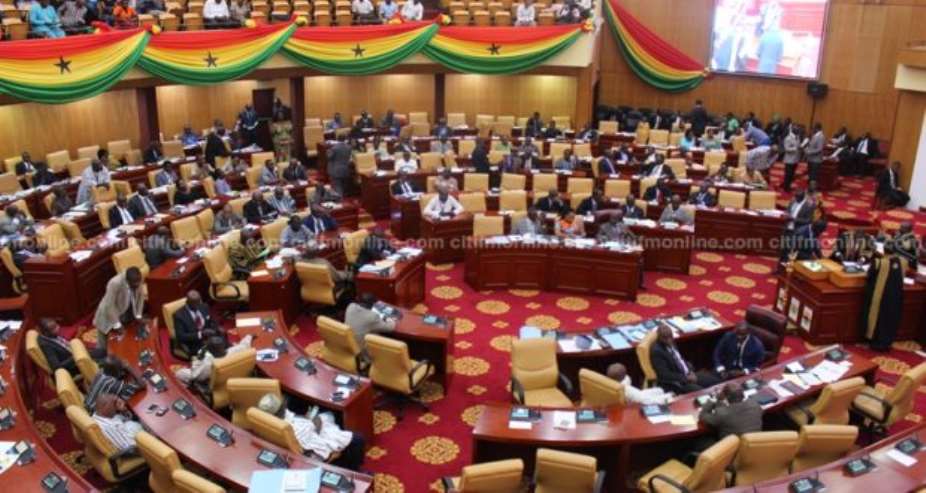Parliament has passed the Restrictions Bill on Thursday, March 19.
The passage was after a vote on the bill which was brought before the House under a certificate of urgency.
The Minority in Parliament had argued against a proposition indicating that nothing about the provisions of the bill suggested it was of an urgent nature.
The Majority, however, insisted that the bill must be passed to back the President's measures aimed at dealing with the COVID-19 pandemic.
The Minority however raised concerns about the number of MPs in the house that approved the decision and threatened court action.
The development now gives the president the powers to impose restrictions on the movement of people in the event of a disaster or emergency.
The emergency legislation was brought to Parliament in accordance with Article 21 (4) (c) and (d) of the Constitution.
Minority rejects request to consider Restrictions Bill under certificate of urgency
The Minority in Parliament had earlier rejected the government's request for the Imposition of Restrictions Bill to be passed under a certificate of urgency.
According to Chairman of the Subsidiary Legislation Committee Of the House, Dr. Dominic Ayine, the Bill is too broad and does not concern itself specifically with dealing with the spread of the novel coronavirus.
Speaking to Citi News, the Bolga East MP said the Minority side “want a Bill that is narrowly tailored to deal with the coronavirus.”
“This is a Bill that is intended to give the president overboard powers to restrict freedom of movement, freedom of speech and even freedom of thought,” he said.
After the Minority Chief Whip made similar comments, Dr. Ayine also said the Public Health Act was enough comprehensive legislation to deal with the novel coronavirus pandemic.
“There are adequate legal provisions in existence to deal with the matters that are going to be addressed by this Bill. So it is an unnecessary grant of authority to the president to restrict movement,” he argued further.
About the Restrictions Bill
This Bill acknowledges the general fundamental freedoms guaranteed under article 21 of the Constitution but also takes into account the fact that the fundamental freedoms guaranteed under the Constitution are subject to laws that are supposed to be in the interest of public safety and public health as provided in paragraphs (c), (d) and (e) of clause (4) of Article 21 of the constitution.
Its purpose is to provide powers to impose restrictions on persons in the event of a disaster, emergency or similar circumstance, to ensure public safety and protection.
It also allows for the imposition of restrictions on the freedom of entry into Ghana or movement in Ghana of a person who is not a citizen of Ghana.
---citinewsroom





 Tuesday’s downpour destroys ceiling of Circuit Court '8' in Accra
Tuesday’s downpour destroys ceiling of Circuit Court '8' in Accra
 SOEs shouldn't compromise on ethical standards, accountability – Akufo-Addo
SOEs shouldn't compromise on ethical standards, accountability – Akufo-Addo
 Father of 2-year-old boy attacked by dog appeals for financial support
Father of 2-year-old boy attacked by dog appeals for financial support
 Jubilee House National Security Operative allegedly swindles businessman over sa...
Jubilee House National Security Operative allegedly swindles businessman over sa...
 Nobody can order dumsor timetable except Energy Minister – Osafo-Maafo
Nobody can order dumsor timetable except Energy Minister – Osafo-Maafo
 Mahama wishes National Chief Imam as he clock 105 years today
Mahama wishes National Chief Imam as he clock 105 years today
 J.B.Danquah Adu’s murder trial: Case adjourned to April 29
J.B.Danquah Adu’s murder trial: Case adjourned to April 29
 High Court issues arrest warrant for former MASLOC Boss
High Court issues arrest warrant for former MASLOC Boss
 Align academic curriculum with industry needs — Stanbic Bank Ghana CEO advocates
Align academic curriculum with industry needs — Stanbic Bank Ghana CEO advocates
 Election 2024: We'll declare the results and let Ghanaians know we've won - Manh...
Election 2024: We'll declare the results and let Ghanaians know we've won - Manh...
